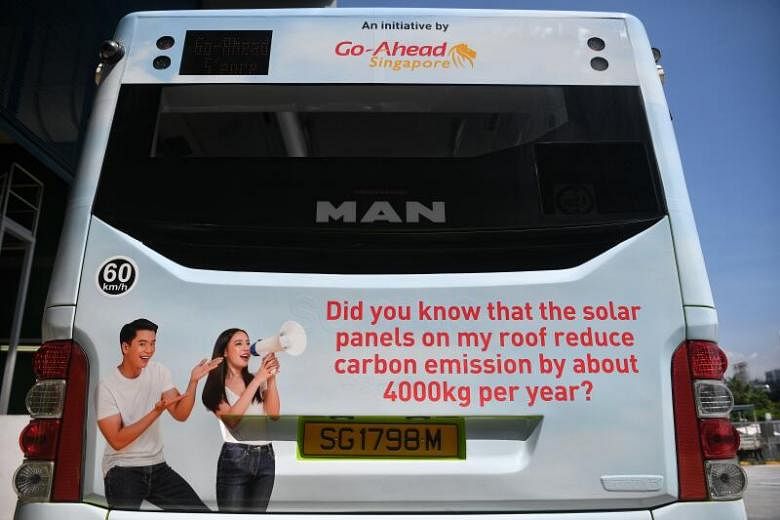SINGAPORE - The first public buses fitted with ultra-thin solar panels started plying the roads on Tuesday (March 30), in a six-month proof-of-concept trial by bus operator Go-Ahead Singapore.
This is the first time such solar panels, which are 1.6mm-thick, flexible and shatterproof, have been installed on buses in Singapore.
They were installed on the roof of two Man A22 Euro 6 diesel-powered buses. These buses will be used on service 15, which starts and ends at Pasir Ris Bus Interchange, in a trial that will run until September.
Weighing less than 20kg, the panels can generate a total of 1,000 watts of energy.
They will be used to charge the battery on the buses, which would otherwise have to rely on the vehicle's alternator. This will in turn reduce the load on the bus engine.
The bus battery is typically used for ignition and to provide power to the bus when the engine is turned off.
The panels are expected to help Go-Ahead Singapore save 1,400 litres of diesel per bus per year. This is about 3 to 4 per cent of the fuel that is typically consumed by the Man A22 buses and translates to a reduction of 3.7 tonnes of carbon emissions per bus per year.
These figures are based on data from a similar trial that Go-Ahead has been conducting since 2019 in Southampton in the United Kingdom, where there are currently 18 buses fitted with these solar panels.
The six-month trial here aims to evaluate how the buses perform in Singapore, how effective the panels are in harnessing solar energy and reducing fuel consumption, and to ensure that the panels are robust enough to withstand the higher temperatures and the daily washing of the buses.
Given Singapore's sunny and tropical climate, buses equipped with solar panels are expected to do even better here, said Go-Ahead Singapore managing director Andrew Thompson.
He added: "If we see the sort of savings and benefits that we expect, then we would certainly be looking to fit them to more buses, potentially, including the electric buses as well.
"We need to collaborate with the LTA (Land Transport Authority) on this project. The buses actually all belong to the LTA, but they've been very supportive.
"A lot of the diesel buses in Singapore have still got many years of life left in them... By fitting the solar panels, we can make the diesel buses even more green and efficient."

Go-Ahead Singapore said the two buses have undergone rigorous safety assessments by the LTA and have been approved for public road trials.
The panels, which are at least three times thinner than some conventional solar panels, will be inspected weekly in the first two months of the trial.
Go-Ahead Singapore will then do a review to determine the appropriate inspection schedule.
Said Go-Ahead Singapore engineering director Leonard Lee: "Typically, solar panels are big and very heavy. So if you install them on top of the bus, (there will be concerns).
"The ones that we use are ultra-thin and very lightweight. So, we have no issues in this aspect."
Go-Ahead Singapore expects to recoup the cost of the trial within four years from savings resulting from the reduction in fuel consumption.



